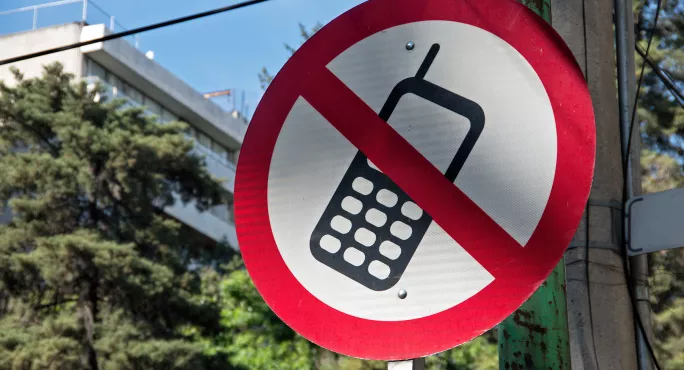Keegan mobile ban ‘unnecessary’ and ‘desperate’, say unions

Unions have criticised the government’s announcement to “ban” mobile phones in schools as a “desperate attempt to grab a headline”.
Gillian Keegan announced a planned clampdown on mobile phones in schools during her speech at the Conservative Party conference this afternoon.
Teaching union bosses said this morning that “most schools already have clear policies around mobile phone use”, and raised concerns that implementing a blanket ban would be a “big challenge” for schools.
- EBacc plan could break DfE workload pledge
- Attendance crisis: MPs call for ‘major’ mental health plan
- Conservative Party conference: What can teachers expect?
Downing Street confirmed that the government was planning to issue guidance to schools on mobile phone use to support leaders “to do the right thing by their pupils and teachers”.
However, it also acknowledged that this would not be statutory.
The Department for Education later said it would consider legislating in the future to make guidance statutory if schools fail to implement it. Guidance will also set out exemptions for when phones may be necessary, such as for medical reasons.
The prime minister’s spokesperson said: “Compelling schools to make the change by putting the guidance on a statutory footing and therefore legislating would take time.
“So we obviously keep that under consideration, if needed, but we think it’s better to act swiftly, which is why we’re issuing this guidance.”
Smartphones are ‘one of the biggest issues’ facing schools
In her conference speech, Ms Keegan said: “Today, one of the biggest issues facing children and teachers is grappling with the impact of smartphones in our schools - the distraction, the disruption, the bullying.
“We know that teachers are struggling with their impact and we know that they need support. So, today, we are recognising the amazing work that many schools have done in banning mobile phones and we’re announcing that we will change guidance so that all schools will follow their lead.”
Teacher Tapp findings from January show that only 7 per cent of schools allow the use of mobile phones at any time, and a further 12 per cent allow them at breaks and lunch.
The vast majority - 80 per cent - banned them outright, did not permit their use during the school day, or only allowed them when specifically permitted by teachers.
Association of School and College Leaders general secretary Geoff Barton said the government ought to focus on the “real problems” facing schools.
He added: “The announcement of a mobile phone ban is a policy which isn’t needed for something that isn’t a problem timed for the Conservative Party conference in a desperate attempt to grab a headline.
“Most schools already prohibit the use of mobile phones during the school day or have robust rules restricting their use to specified circumstances.
“The problems with mobile phones - addictive use, bullying, inappropriate material - generally happen at other times when children are not in school. Schools spend a lot of time dealing with the fallout caused by mobile phone misuse and the damage it does to children.”
‘Blanket ban won’t work for all schools’
Similarly, Paul Whiteman, general secretary of the NAHT school leaders’ union, said most pupils probably would not stop bringing their phones to school - and might need them for things like travelling.
“We are also concerned that a blanket ban won’t work for all schools - we query whether this new policy has actually been sense checked at all with the profession,” he said.
A ban on mobile phones in school “can cause more problems than it solves”, he added. For example, he said, it can lead to “pupils becoming more secretive about their phone use, meaning problems are hidden from staff and therefore more difficult to spot and address”.
Individual schools know their pupils and communities and so are best placed to develop their own policies when it comes to mobile phones in schools, according to what works for them and for pupils’ education and wellbeing, he said.
Phone ban would make behaviour crisis worse
Former education secretary Gavin Williamson said back in 2021 that he wanted to make the school day “mobile free”. Schools minister Nick Gibb admitted at the time that any crackdown might just be a change in the non-legally binding advice it gives to schools.
Eventually, the DfE released new guidance in 2022 saying it was up to headteachers to make decisions about phones. Many schools already require pupils to store phones in lockers, though some are allowed to keep them in bags.
NASUWT’s survey on behaviour in schools back in September found that teachers reported being more concerned about verbal and physical abuse in the classroom than phone use.
The union’s general secretary, Dr Patrick Roach, said today that a blanket ban would be “unenforceable” and make the behaviour crisis worse.
The NEU teaching union’s general secretary, Daniel Kebede, also called for the DfE to focus on teacher recruitment and retention, funding, mental health support and child poverty.
However, DfE school behaviour adviser Tom Bennett tweeted today that schools that had already banned mobile phones “report that students are safer, happier and able to focus far more than they were before - and it’s popular with them, too”.
He added: “And heads should now be reassured that their efforts to keep schools mobile-free will be backed by the DfE. This is a positive and progressive step forward.”
You need a Tes subscription to read this article
Subscribe now to read this article and get other subscriber-only content:
- Unlimited access to all Tes magazine content
- Exclusive subscriber-only stories
- Award-winning email newsletters
Already a subscriber? Log in
You need a subscription to read this article
Subscribe now to read this article and get other subscriber-only content, including:
- Unlimited access to all Tes magazine content
- Exclusive subscriber-only stories
- Award-winning email newsletters



